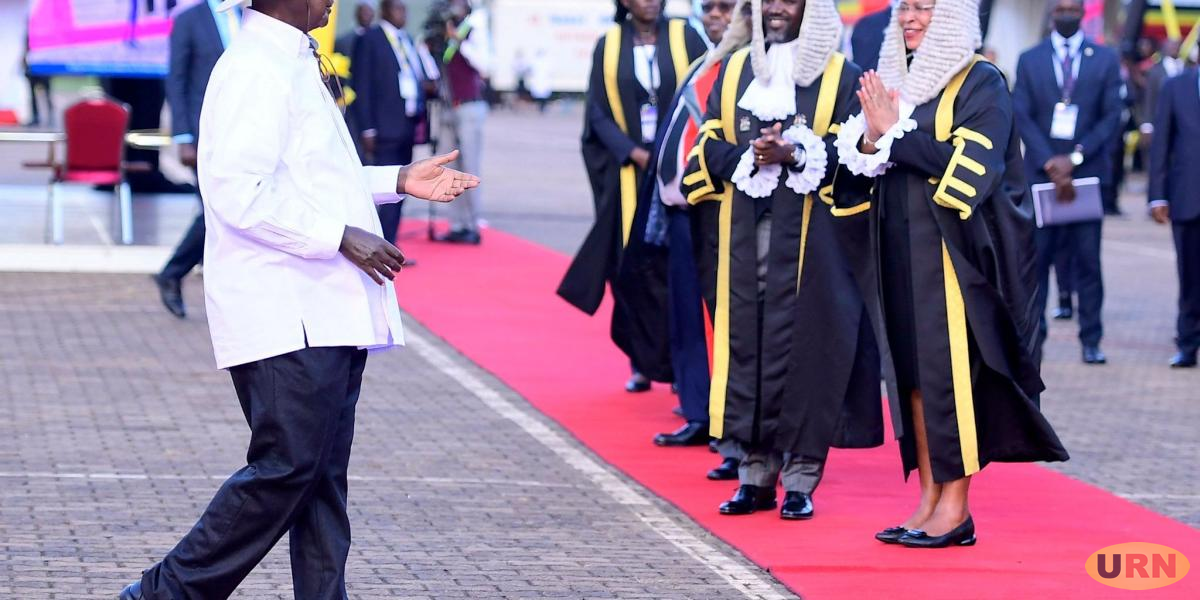President Yoweri Kaguta Museveni of Uganda, who had recently announced his COVID-19 diagnosis, is attending today’s budget reading ceremony virtually.
The president declared on social media that he had tested positive for the virus on June 7, 2023, but stated that he did not feel sick and only experienced slight feverishness in the initial days.
“It is now seven days since I tested corona positive on the 7th of June, 2023. As I told you yesterday, I do not feel sick and I only felt a slight feverishness on the 3 or so first days. Otherwise, I feel ready to move out of self-isolation,” he wrote in a tweet post revealing that he will address Parliament this afternoon, at the budget ceremony.
He mentioned delegating the responsibilities of the ceremony to Vice President Alupo, who will oversee the proceedings while Museveni delivers brief remarks at the end of the budget speech.
Although it has been eight days since his positive test result, indications suggest that the president will soon be out of isolation, as health experts recommend a minimum of 10 days of isolation for COVID-19 patients. However, questions remain about how Museveni could have contracted the virus, considering his adherence to standard operating procedures (SOPs).
Under Museveni’s leadership, Uganda received global recognition for its efforts in preventing the spread of COVID-19. The country implemented measures ranging from personal initiatives such as hand hygiene and mask-wearing to strict regulations like curfews and long-lasting lockdowns. Uganda even had one of the longest school closures, lasting for two years.
While many countries have relaxed contact tracing and testing requirements, Museveni continues to enforce these measures for public ceremonies where he is present. Last week, prior to his State of the Nation address, attendees were required to undergo COVID-19 testing. However, the president later revealed that he had contracted the virus.
Public health experts were consulted regarding how Museveni could have contracted the virus despite his adherence to SOPs.
Dr. Misaki Wayengera, a virologist at Makerere University, explained that it is challenging to trace the source of infection for the president. He noted that there is currently a surge in flu-like illnesses, which is typical during this seasonal period related to the influenza virus life cycle. He added that cases tend to increase between May and June and towards the end of the year.
Dr. Wayengera stated that although the president follows SOPs diligently, there are no plans to introduce new measures. The government has been advised to incorporate COVID-19 into routine care, treating it like other endemic infections in the country, such as malaria.
“Following SOPs should be a personal initiative as the number one citizen has done. Elsewhere people stay at home and isolate themselves when they get the flu or they wear masks when going out. Any person getting COVID-19 should not cause any scare,” the doctor said explaining that they have downsized the COVID-19 response and are currently doing surveillance as is down for all infections.
We also put these questions to Prof Jayne Byakika the COVID-19 Incident Manager at the World Health Organization (WHO) Africa Regional Office who said even as the dominant omicron strain of COVID-19 is mild, people of advanced age like the president can easily get infected and develop severe disease if especially they are not vaccinated.
She said all SOPs should still be followed and people take a personal initiative to seek booster doses for those that are fully vaccinated and wear a mask if they have flu-like symptoms and would like to attend outdoor events.
The same views are shared by Health Minister Dr. Jane Ruth Aceng who rather encouraged people not to panic because of the President’s infection but take personal initiative and maintain proper prevention practices as the whole African continent is recording an average of 6000 new infections each week from a peak of over 308000 cases weekly at the start of the year in 2022.
However, doctors recommend that the Ministry should instead issue general guidelines for people to follow to manage all flu-like illnesses.

